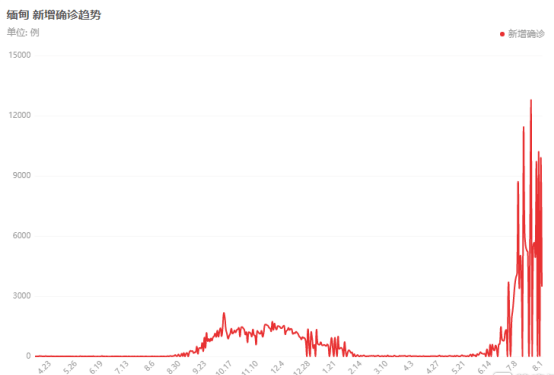In October 2020, Delta was discovered in India for the first time, which directly led to the second wave of large-scale outbreaks in India.
This strain is not only highly contagious, rapid replication in the body, and long time to turn negative, but also infected people are more likely to develop severe illness. Today, the delta strain has spread to 132 countries and regions.
WHO Director-General Tedros said on July 30 that the infection rate in most parts of the world has increased by 80% in the past four weeks. Tedros said at the press conference: “The hard-won results are in danger or disappearing, and the health systems in many countries are overwhelmed.”
Delta is raging around the world, and the epidemic in Asia, especially Southeast Asia, has taken a sharp turn.
On July 31, many Asian countries announced a new high record of confirmed cases caused by Delta.
In Japan, since the beginning of the Olympic Games, the number of newly diagnosed cases has continued to hit new highs, and athletes and referees have been diagnosed every day. On July 29, the number of new cases in a single day in Japan exceeded 10,000 for the first time, and then more than 10,000 were diagnosed in four consecutive days. If this continues, Japan will face a major explosion of the new crown epidemic.
On the other hand, the epidemic in Southeast Asia is worrying. Both Thailand and Malaysia announced record numbers of new crown infections last weekend. The overburden of hospitals in Malaysia caused doctors to strike; Thailand announced the 13th extension of the lockdown period, and the cumulative number of confirmed cases exceeded 500,000; Myanmar was even considered by United Nations officials to become the next “super spreader”, with a mortality rate as high as 8.2%. It has become the most severely affected area in Southeast Asia.
The continued increase in the epidemic in Southeast Asia is closely related to the penetration rate and effectiveness of vaccines. Currently, the top three countries in Southeast Asia are Singapore (36.5%), Cambodia (13.7%) and Laos (8.5%). They are mainly from China, but the proportion is still a minority. Although the U.S. is speeding up its promotion of donating vaccines to Southeast Asia, the numbers have fallen short.
Conclusion
It has been a year and a half since the outbreak of the new crown. Such a long front has gradually made people gradually immune and numb to its dangers and relaxed their vigilance. This is why the domestic and foreign epidemics have rebounded repeatedly and seriously exceeded expectations. Looking at it now, fighting the epidemic will definitely be a long-term process. The penetration rate of vaccines and the control of virus mutation are more important than promoting economic development.
Overall, the rapid spread of the mutant strain of Delta virus around the world has once again plunged the global economy into huge uncertainty, and the extent and depth of its negative impact remains to be seen. However, in terms of the speed of transmission of the mutant strain and the effectiveness of the vaccine, this round of the epidemic must not be ignored.
Post time: Aug-04-2021




